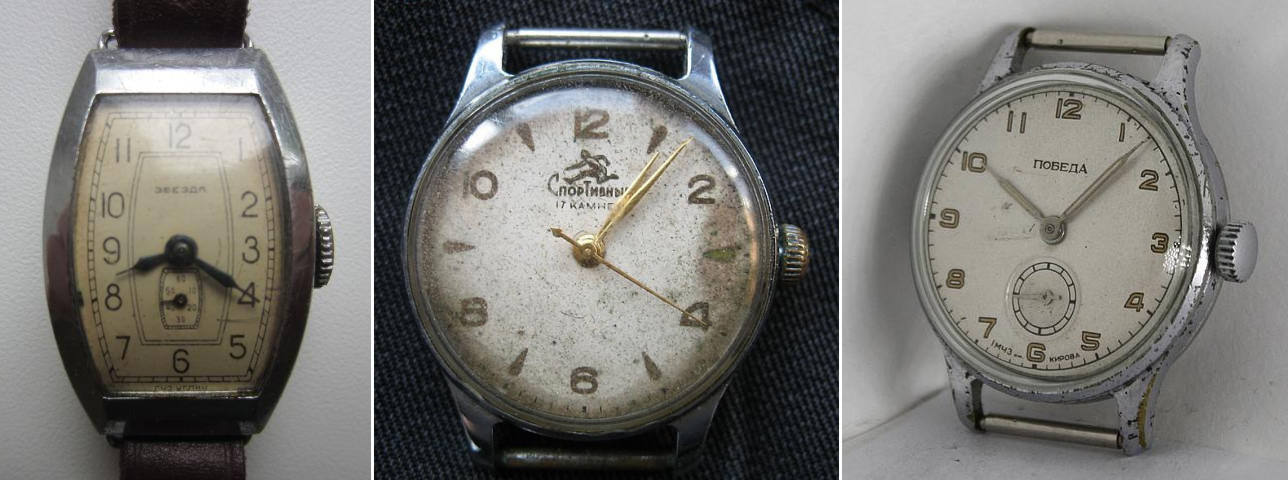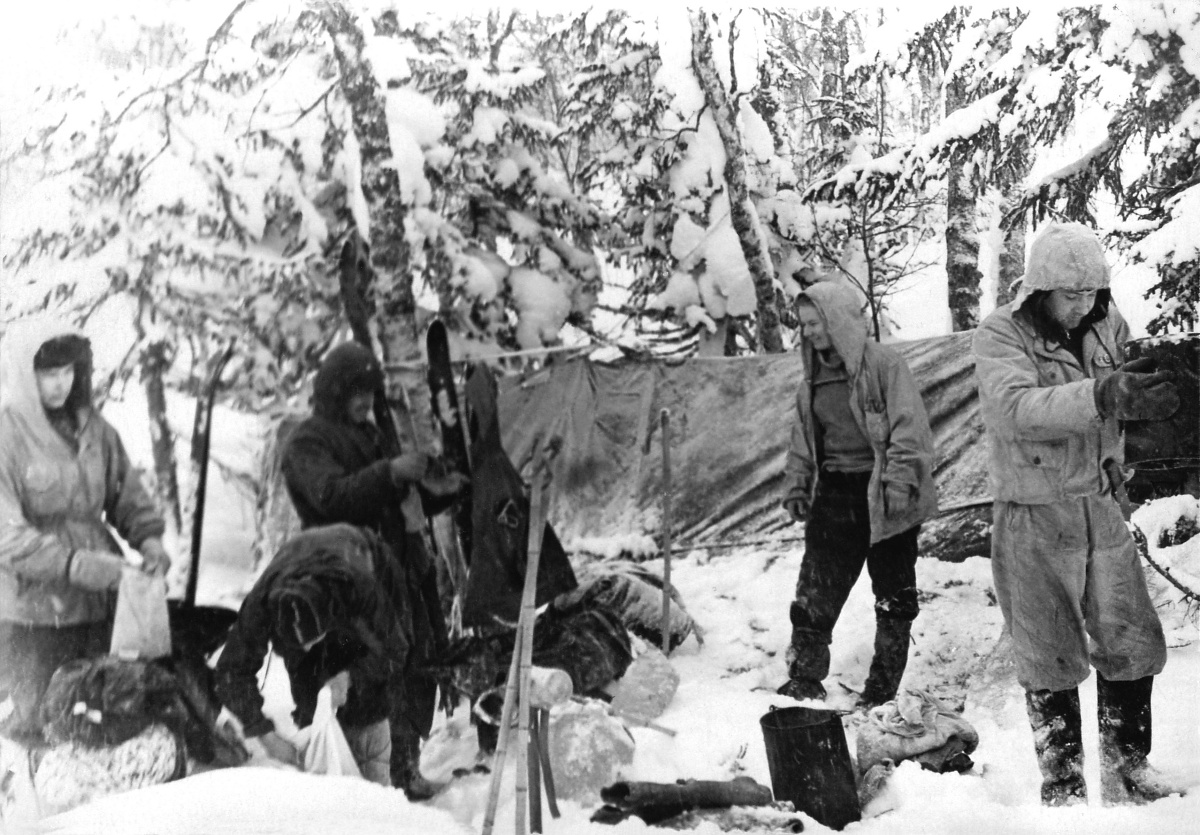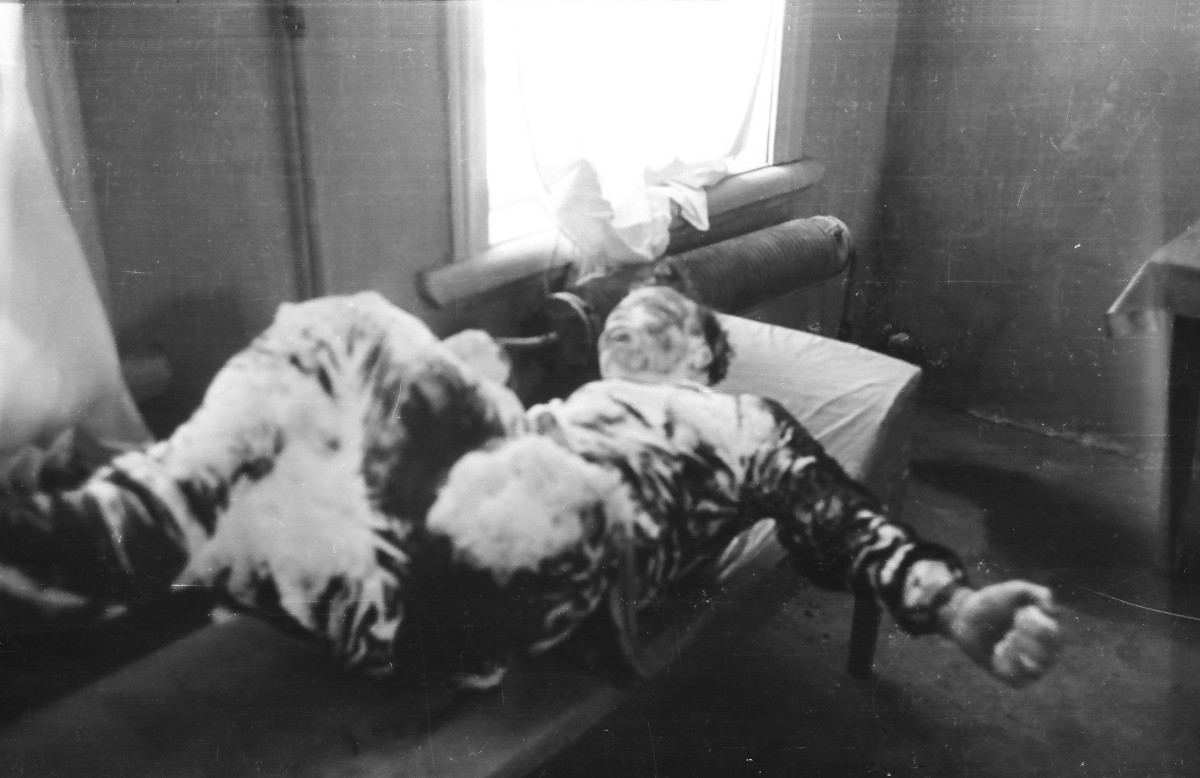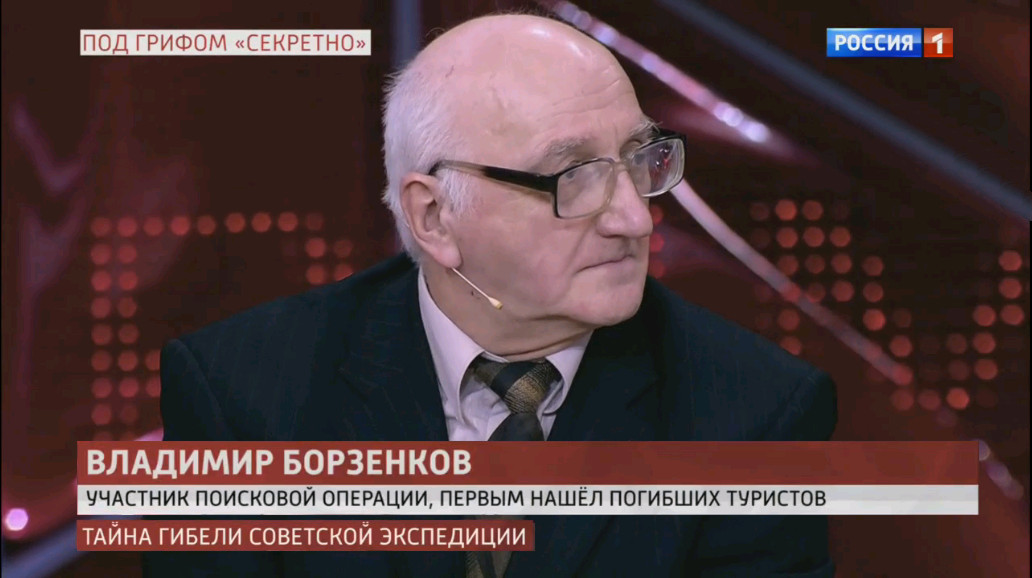In the Case files are mentioned 4 watches: Dyatlov is wearing Zvezda, Slobodin - Pobeda, Thibeaux-Brignolle - Pobeda and Sportivnye.

In the Case files are mentioned Zvezda, Sportivnye and 2 x Pobeda.
Dyatlov was found with Zvezda on his left hand showing 5:31.
Case files I - 121 Autopsy: "On the lower third portion of the left forearm there is a Zvezda brand watch; the hands of the watch show 5:31."
Case files I - 69 Maslennikov testimony: "On his hand Dyatlov was wearing a wristwatch that stopped at 5:31."
Case files II - 41 Ivanov: "Wrist watch Zvezda 5:31"
Case files II - 45 Ivanov: "Zvezda 5:31 on Dyatlov"
Case files II - 46 "I, A.A. Dyatlov received from Ivanov:... 5) Wriswatch Zvezda on a strap with arrows coated with luminous substance."

On this photo Dyatlov (bent down) is wearing a watch on his right hand, but he was found with watch on his left hand.
Slobodin was found with Zvezda Pobeda on his left hand showing 8:45.
Case files I - 96 Autopsy: "On his wrist is a Zvezda brand watch showing the time 8:45."
Zvezda is mentioned only in the autopsy report. The rest of the documents read Pobeda and Slobodin owned a Pobeda.
Radiogram 183 "On his wrist a watch Pobeda stopped at 8:45"
Case files II - 73 "I, N. F. Slobodina received from prosecutor comrade Ivanov:...3. Watch Pobeda on a strap."
Thibeaux-Brignolle was found wearing two wrist watches on his left hand, a Pobeda showing 9:38 or 8:38 and Zportivnye showing 9:15 or 8:15.
Case files I - 341 "...on his first hand are two watches brands Pobeda and Sportivnye the watches show - Pobeda 9:38, and the Sportivnye 9:15"
9:38 is repeated once more in this document. Must be an error that the times in both watches are off with an hour.
Case files I - 352 Autopsy: "On the left forearm there are two watches: a Sportivnye watch showing the time 8:14:24, and a Pobeda brand watch showing the time 8:39."
Case files II - 72 "I, Elizaveta Iosifovna Muzafarova,... received Pobeda wristwatch... belonging to Nikolay Tibo."
Sportivnye is identified by his relatives to belong to Krivonicshenko.
Case files II - 9 "I, Igor Alekseevich Krivonischenko received from Prosecutor comrade Ivanov:...3. Wristwatch Sportivnye"
Why is Tibo wearing Krivonicshenko’s wristwatch? I have came across three theories:
- Krivonicshneko was on duty previous night and he past his watch to the next attendant - Tibo. Tibo will make sure to wake up the group on the next morning.
- Tibo and Krivo were friends, they likes swapping things, like the photo duel when each took his friends camera and they made photos of each other. If Krivo had to do something and his watch was in the way most probably he would have given his watch to Tibo for safe keep. Activities like these are washing dishes, but there was no water in the vicinity of the tent, chopping wood, but there were no trees around.
- Krivo died first and Tibo took his watch as a remembrance to return to his family.

Krivonischenko (left) and Tibo (right) - these two photos ate taken at the same time with swapped cameras.
On the photo below some people see 2 watches, although I believe this is a fiber or defect on the film.
Here is a link to the original photo.
Link to the original photo of the bodies in the river where the two watches on Tibo wrist can be clearly seen.
Zolotaryov had a watch Pobeda on this trek that he was not wearing when they found his body.
Later watch Pobeda was among the Zolotaryov’s belongings that were given to Sogrin until his mother arrived for identification.
Case files I - 258 "I, Vera Ivanovna Zolotaryeva, mother of Semyon Alekseevich Zolotaryov, received from Prosecutor comrade Ivanov the following items that the student Sogrin handed over as belonging to my son: wristwatch Pobeda 1 MWF (Minsk Watch Factory) on a strap, in working condition..."
Kolevatov’s Molnya was in the items brought back from the tent but not in the inventory.
So far we have 5 watches. Here is a sixth one:
Grigoriev notebook 2 "There is a pocket watch in the pocket of one backpack, which stopped at 2:15." "Vishnevskiy took the letter, the purse, money, diaries and watches."
Kolevatov kept his watch in the pocket while Zolotaryov wore his Pobeda on the left hand. This is why we attribute the time 2:15 to the Molnya. It was put in a backpack with all the items found in the tent and later on identified by his sister. This watch never made it into the inventory included in the case files.
Case files II - 50 "Kolevatov's sister: My brother had a pocket watch, he fixed it, similar to the one here (Molniya)..."
Doroshenko was poor, he didn’t have a watch. Or at least there is no photo of him before or during the trek wearing one. We see Zina and Lyuda wearing watches on other treks but we do not have a photo from the trek to Otorten of the girls wearing a timepiece.
| Dyatlov |
5:31 |
|
| Slobodin |
8:45 |
|
| Tibo |
8:39 |
8:15 |
These times made people wonder if there is a connection between the time of death and the time showing on the watch. I was recently given an article by Vladimir Borzenkov, who is a Dyatlov case avid follower and researcher, but more importantly he took part in more than 20 rescue operations, some of them in very similar regions and climates. I will be publishing a long article about another incident, which was the first one to surpass the Dyatlov Pass incident by duration and complexity of the search operations, and the number of dead. This is the Chivruay tragedy. Vladimir Borzenkov took part in the search in 1973, he was the one handling the bodies. I will tell you in more detail about his experiment in Lovozerskie Tundry, but in that case also they had frozen bodies with wrist watches and they wonder f the fact they stopped in the span of 30 mins per each group that allegedly died together. In Dyatlov Pass we have a body with two watches and they stopped 24 mins apart. Borzenkov makes a very important discovery - the watch of the last frozen body found continue to work after the body thawed. Unfortunately we don’t have this information for Dyatlov group.

Slobodin thawing in the Ivdel morgue. The "Pobeda" is still on his frozen hand.
There are 3 reasons a manual wind watch to stop in this conditions:
- Fully unwind
- The lubricant freezes
- Condensation freezes
- If the watch is placed on a frozen surface with good contact e.g. ice, then one part of the watch will promptly freeze and the mechanism can stop working due to large difference in temperatures among the parts.
Many experiments are done on the subject. Here is one
http://sledopyt1959.mybb.ru/viewtopic.php?id=394#p11753The time on these three watches was set to 12:00 and they were placed in a freezer with a temperature of -20°C (-4°F) for 2 hours (two-compressor refrigerator with an electronic control unit, it keeps the temperature quite accurately). The result is in the photo. The watches stopped in the span of 8-25 minutes. After taking them out of the freezer and let to thaw they continue working normally.
The bottom line is that the watches on the bodies may tell us when the bodies hit the frozen ground where they were found.
You will have more information on the subject next week straight from Borzenkov.

Vladimir Borzenkov, member of the search party in Chivruay tragedy, he found some of the bodies